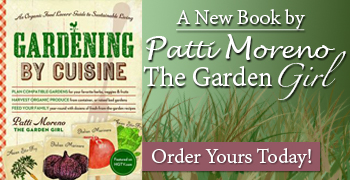Six Ways to win the Fight against Garden Pests
Your garden’s enemies are so small you can’t even see them, but they are powerful enough to wreak havoc on all of your hard work! Check out this video which focuses on my personal secret weapon (see tip #6). Below are five other non-toxic ways to engage in garden wars and win!
A few common garden pests are:
- Aphids - Tiny greenish bugs that live in clusters under the leaves of your plants. They suck the sap from the leaves and roots, depleting the plant of its nutrients while destroying it in the process.
- Nematodes - Worm-like creatures that feed on your veggie roots destroying your plants.
- Slugs - shell-less snail-like creatures that feast on leafy greens making them look like Swiss cheese
Tip 1# Keep your garden movin’! - Rotate
The potato famine in Ireland is a prime example of when crop rotation would have made a difference. For years farmers were able to get high crop yields from the same small plots until a bacterial infection established itself where the potatoes were planted, destroying the harvest, starving millions. No matter what size your garden is, keep the plants movin’!
Tip # 2 - The David Copperfield of the garden - Marigolds!
Marigolds don't just add a dash of color to your garden, they are the magicians of the garden. The roots of Marigolds create a natural repellent that penetrates the soil and keeps away harmful nematodes and aphids. Every February, I start by planting hundreds of marigolds indoors. My top choice is French Petite Marigolds because they stay small and won’t compete with your vegetables for nutrients, water, or sunlight.
Tip # 3 - Pow Pow – Take That! Basil fights back
Sweet smelling and delicious basil also happens to be a great bug deterrent that helps keep the tomato horn worm and a bunch of different leaf chewing beetles at bay. Basil not only fights snarky and nearly invisible pests, it manages to infuse their delicious flavor into the tomatoes making for an unforgettable treat. This also works with other fragrant herbs.
Tip #4 - Walk on Egg Shells!
Slugs are the gardener’s worst nightmare, punching holes into every plant you’ve ever loved. Place your crushed egg shells on the soil around your plants. The slugs begin gliding over the eggshells and the jagged edges of the crushed egg shells hurt the soft slug bodies. To avoid pain, slugs turn the other way, right out of your garden. This is the one time that walking on eggshells is a good thing.
Tip # 5 – Treat it with a Lady
Ladybugs are a natural pest killer. What a coincidence… Aphids happen to be a Ladybug’s favorite food. An easy way to jumpstart your ladybug population is to start your own colony by purchasing a lady bug breeding kit available at garden centers or online. Start them in the spring and they’ll quietly do the job, like only a Lady can.
Tip #6 – Meet DE, my secret weapon for non-toxic warfare
Diatomaceous Earth, (aka DE), is naturally occurring fossilized algae and it kills all insects, snails, and slugs by causing death by dehydration. The problem with DE is that it’s an equal opportunity killer; killing all bugs, even the good ones like bees and lady bugs. DE comes in powder form and is completely non-toxic to humans and animals like dogs and cats. It should only be used in extreme circumstances.
Tips for safely using DE
- I suggest using a duster as you will see in the video, for even and easy distribution
- Wear a dust mask when applying it!
- Make sure to apply it on a day that you know it isn’t going to rain
- Wet all of your plants before dusting. The moisture helps the dust adhere to the leaves of the plants.












